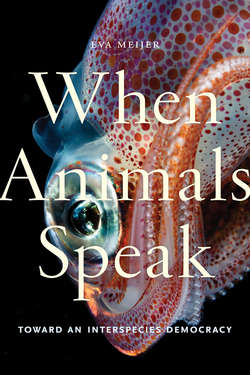Читать книгу When Animals Speak - Eva Meijer - Страница 30
На сайте Литреса книга снята с продажи.
Speaking Bodies
ОглавлениеIn creating common interspecies language games and common understanding we need to take the different ways in which animals express themselves into account. Hearne uses words, gestures, and body movements to teach Salty to retrieve; Salty runs and moves, and uses gestures, sounds, and eye contact to reply. Howard and the birds communicate with song, human words, gestures, movements, and other expressions. The body also plays a major role in human language games (Wittgenstein 1978), but so-called “body language” is often thought of as a weaker or less precise form of communication. Locating language in the mind refers back to Descartes’s mind-body dualism, and to an idealized view of language. As we saw in chapters 1 and 2, the image of language as located in the mind can be challenged in different ways, and various philosophers (Derrida 2008; Heidegger 1927; Wittgenstein 1958, 1978) argued for a more situated idea of language, interconnected with relations and social practices. Wittgenstein (1958) also emphasizes that in language games, gestures, movements, ways of using one’s voice, and other expressions can be as important, or more important, than words.
In the work of Maurice Merleau-Ponty (1962) we can find some helpful motives for further exploring the embodied aspects of language in an interspecies context. In developing his view of language, Merleau-Ponty focuses strongly on the role of the body, on the basis of which he also sees an ontological connection to other animals. According to Merleau-Ponty (1962), we are not thinking, but speaking subjects. Expression completes thought; speech does not translate thought into words, but rather accomplishes it. A thought is not a representation: speech and thought are interconnected. Thoughts are not internal, and do not exist separately from the words we use and the world in which they are used. Bodies play an important role in language because they form the shape of speech, and thus meaning. Expression brings meaning into existence, and words are so many ways of “singing of the world” (1962, 217). By locating meaning in the words themselves, Merleau-Ponty aims to refute both empiricism—according to which speech is a mechanistic response—and intellectualism (or rationalism) in which words are seen as empty containers for pre-formed thoughts. In contrast to Saussure, who privileged langue
